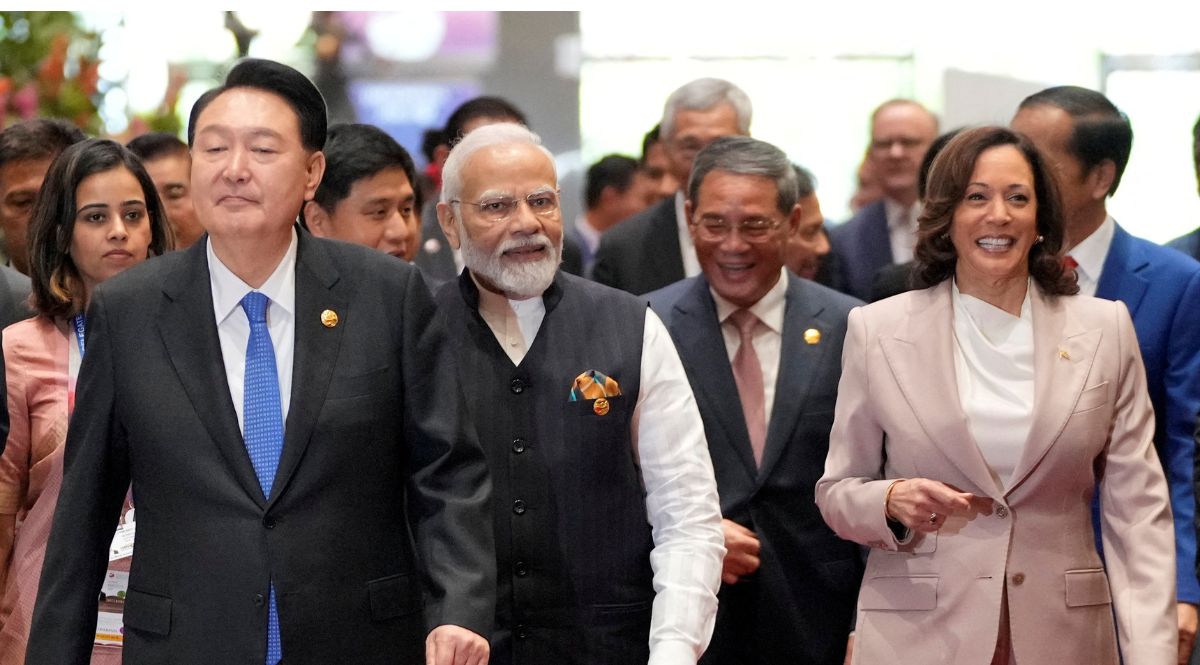U.S. Presidential Election: If Trump Wins, Foreign Policy Likely to be Similar to First Term
If Donald Trump is elected president, it may result in a reduction or complete suspension of U.S. support for Ukraine, followed by efforts to conclude a peace agreement with Russia. The consequence of a less-important Europe for his administration may be a reduction in the presence of American troops in Europe, justified by the greater need to act to deter China. Trump also will clearly support Israel in the war against Hamas, wanting to bring about a quick end to the conflict.
.jpg) POOL / Reuters / Forum
POOL / Reuters / Forum
Foreign policy is a significant element of this year’s U.S. presidential election campaign, primarily because of American interests in Russia’s war against Ukraine and Israel’s war against Hamas. Although foreign policy is not as high on the list as the economy, immigration and border protection, or education, voters still indicate that such issues are important to them. In a Gallup survey from September, respondents indicated at least “great importance” of the candidates’ positions on terrorism and national security (83%), foreign policy (70%), the situation in the Middle East (64%), trade with other countries (62%), relations with Russia (60%), and relations with China (59%).
Europe and Transatlantic Cooperation
Trump’s priority in Europe policy will be to end the war in Ukraine as quickly as possible. During the campaign, he announced that he would like to achieve this even before being sworn in as president. To achieve this, he probably would first enter into talks with Russia to establish the terms of a ceasefire, and only then talk with Ukraine. The result could be U.S. pressure on Ukraine to make far-reaching concessions that would guarantee an end to the hostilities. Trump’s personal biases may influence his approach to Ukraine, such as his unsuccessful pressure on President Volodymyr Zelensky to instigate anti-corruption investigations. The attempt to reduce U.S. support for Ukraine also stems from the shared views of his vice presidential candidate, Senator J.D. Vance, who has stated that continuing aid is not in the U.S. interest. The majority of Trump’s conservative electorate also supports this view. In a survey for Newsweek, 41% of such voters supported “rethinking support”, while 26% supported stopping it altogether. A similar view is notable among Congressional representatives, where 112 out of 214 voting Republicans in the House voted “against” the support package for Ukraine in April 2024. However, this was partly related to their opposition to not proceeding with a parallel bill on tightening border protection.
The issue of talks with Russia will also affect all decisions regarding U.S. military involvement in Europe and the approach to NATO. Although seeking to withdraw the U.S. from the Alliance seems unlikely, Trump may question America’s readiness to implement Alliance commitments (as he has done many times), which will have a destructive impact on NATO unity and may contribute to the renewed strengthening of voices about the need to develop European strategic autonomy. At the same time, the administration may seek to reduce the U.S. military presence in Europe, citing the prioritisation of the threat from China and the desire for greater involvement in the Indo-Pacific with some form of freezing the conflict in Ukraine. An additional pretext may be political and related to the failure so far of all NATO countries to allocate at least 2% of GDP to defence—or 3%, as Trump has demanded during the campaign. His and the Republicans’ approach to the EU as an economic rival will also have an adverse impact on transatlantic cooperation. The new administration may abandon political cooperation in the U.S.-EU leaders format and in some consultative groups. If Trump implements his promise to impose 10%-20% tariffs on all goods imported to the U.S., it could spark a global tariff war and further deteriorate relations with the EU and European countries, and also with non-European partners.
The Middle East
Trump will present unwavering support for Israel and its actions against Hamas, Hezbollah, and Iran. This will be a continuation of the policy during his previous presidency that led to the U.S. recognising Jerusalem as Israel’s capital, moving the U.S. embassy there, and recognising Israel’s sovereignty over the Golan Heights. As with Trump's first term when no attention was paid to Israel’s illegal settlements in the West Bank, a second administration could allow Israel to maintain its occupation of part of Palestinian territories (leading to displacement), which would be justified by the need to ensure security and effectively dismantle Hamas. The United States under Trump could not only increase the scale of military aid provided to Israel but also engage in operations against Hamas and Hezbollah in a limited way (sea and air attacks). The aim would be to quickly stabilise the region by militarily combating the threats posed by groups supported by Iran. Ultimately, this would limit the latter’s potential for regional destabilisation and operations against American troops and/or their partners in the region. In the longer term, this would enable Trump to reduce U.S.. involvement in the Middle East, thus implementing his isolationist concepts. It cannot be ruled out that the new authorities would be ready to engage in a diplomatic process with Iran, the aim of which would be to stop the development of its nuclear programme. The former president signalled this possibility during the recent election campaign.
China and the Indo-Pacific
The Trump administration will prioritise engagement in the Indo-Pacific to compete more effectively and decisively with China. Trump may intensify his economic protectionist approach towards it by, among others, raising rates and extending tariffs to all Chinese imports (up to 60%). The goal would be, on the one hand, to reduce the trade deficit with China ($27.2 billion in July this year), and on the other hand, to increase state revenues, which would be lower after planned tax cuts (e.g., for corporations from 28% to 15%). and strengthening U.S. manufacturing capabilities in sectors such as metals, electronics, and pharmaceuticals. Aggressive policy towards China raises the risk of starting another trade war, which would also at least indirectly affect other countries due to their dependence on the American and Chinese economies. This would increase the risk of economic recession in the U.S. and instability in global markets.
Trump’s bilateral relations with regional partners in terms of security will be transactional in nature. This means a return to the policy of questioning U.S. defence obligations and putting pressure on partners such as Japan, South Korea, or Taiwan to increase military spending and purchase weapons from the U.S. or to finance the presence of American troops on its territory to a greater extent. Closer military cooperation with Australia and the Philippines would also be an important area. Despite Trump’s criticism of multilateral cooperation, his administration likely will develop cooperation within QUAD and AUKUS in order to counteract China’s influence in the Indo-Pacific. It is possible that U.S. allies outside the region (especially in Europe) will also be encouraged to increase their involvement in the Indo-Pacific, which does not necessarily mean military activity there.
Conclusions and Perspectives
If Trump returns to power, U.S. foreign policy in key areas will be a continuation of the actions of his first term, defined primarily by a transactional approach to cooperation with other countries. The decision to provide more significant political and military support to Israel, although it may lead to a quicker end to military operations, increases the risk of the conflict expanding, which may result in more active involvement of Iran. At the same time, a fundamental change in Trump’s approach compared to his first term would be the possibility of engaging in a diplomatic process with Iran aimed at limiting its nuclear ambitions. It could also serve to alleviate tensions and de-escalate, preventing the war between Israel and Hamas from expanding into a regional conflict.
The transactional approach to cooperation with allies will undermine U.S. credibility in Europe and the Indo-Pacific, which may be compounded by likely statements by Trump suggesting the U.S. could withhold support in a conflict between countries that do not invest sufficiently in their own defence. This will make it difficult to coordinate the potential of U.S. allies in strengthening security in both regions at the same time. In Europe, there will be an increased risk that some countries will balance the lack of U.S. leadership by striving to reduce tensions in relations with Russia or by accelerating the development of EU defence competences (strategic autonomy). A forced ceasefire in Ukraine may only lead to a short-term halt to Russia’s aggression. Possible territorial concessions by Ukraine may in the long run encourage Russia to escalate again, including even towards NATO countries. Taking into account the likelihood of Trump undermining U.S. credibility, the scenario of Russian escalation is even more likely. Poland can reduce some of the risks by developing bilateral cooperation with the U.S. and using the Three Seas Initiative to attract American investments to the development of communication and energy infrastructure connecting the countries of Central Europe. It will also be necessary to use Poland’s position in NATO and the EU to strengthen the European pillar of the Alliance (as an alternative to strategic autonomy) in order to maintain the credibility of defence and deterrence and maintain support for Ukraine.




.png)
.png)
